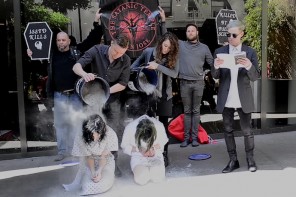Last month, the American Psychiatric Association (APA) was forced to cancel a workshop examining the intersection of homosexuality, religion, and therapy when Bishop Gene Robinson, a key panelist, withdrew in response to gay groups’ protests over his appearance with advocates of reparative therapy.
This cancellation, while unfortunate, is hardly surprising given that pro- and anti-gay groups are locked into a continual struggle over the authority to define social perceptions of homosexuality. In the midst of this struggle, controlling the messages at a workshop that combines religion and social science holds real political significance. After all, religion is arguably the most powerful moral arbiter in our society and is therefore a critical tool to wield in the debate. Making headway in this struggle (for either side) thus requires gaining footholds in religious groups and developing theological support. Likewise, social scientific research and expert testimony can lend additional credibility and empirical support to a perspective. So it is easy to see why this forum became a skirmish in the large scale campaign both sides wage to control messages.
But social debates surrounding homosexuality won’t get resolved with this kind of thinking and acting. In fact, structuring the debate around whose Truth is actually true sidesteps the key issue and ensures we stay mired in a discussion which is unlikely to result in equality for gay people. As the issue is currently constructed, most gay advocates assert that people are either born gay or that God created them as gay to fulfill divine purposes. From this perspective, trying to change one’s sexuality is, at best, futile and, at worst, defying God. In other words, gay advocates hold that there is no choice; consequently, they argue that the right course of action is to treat homosexuals with compassion and equal rights. The unintended implication of this view, of course, is that people would be heterosexual if they could choose, and so homosexuality remains a stigmatized, if unpreventable, form of sexuality.
By contrast, ex-gay advocates believe that homosexuality is chosen—whether in terms of feeling same-sex desire or acting on those desires. Therefore, given that ex-gay advocates perceive homosexuality an immoral choice, the right course of action is to help homosexuals resist those desires and change. Neither gay nor ex-gay advocates challenge the stigma imposed on homosexuality, and they reduce the debate to an all too simple formula: If no choice, then rights. If choice, then no rights. Given this framework, activists on either side of the debate busy themselves trying to find religious and/or scientific proof for something that is, as of the present moment, simply unprovable—the origin of sexual desire.
This formulaic choice/no choice framework of the debate keeps people from asking the truly important question that should be the heart of the matter: in these democratic United States, do mutually consenting adults have the right to freely, without coercion or sanction, choose their sexual partners? If the answer is yes, then no rights of citizenship can be withheld for this choice. Why people make the choice they do (or whether they have a choice) matters not at all—at least not for acquiring rights and privileges. Yes, religion and its varied truths impact how people feel about such choices, and the APA is smart to recognize that religion is likely to be an important component of developing therapeutic strategies for helping people deal with these feelings as they work to reconcile faith and sexuality.
Religion does certainly matter in how people experience their sexuality, as well as how others react to it and to them. As a result, religion, and its varied moral implications, will continue to be a vital aspect of cultural discussion surrounding homosexuality. But equal rights and privileges should not rest on debates about religion and homosexuality and the choice/no choice dichotomy. They rest instead on a profound, but simpler and more answerable, question about the freedoms that should be extended to citizens of a democratic nation.



